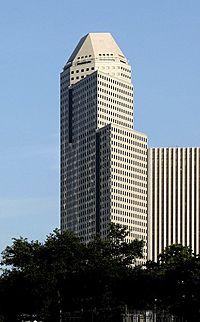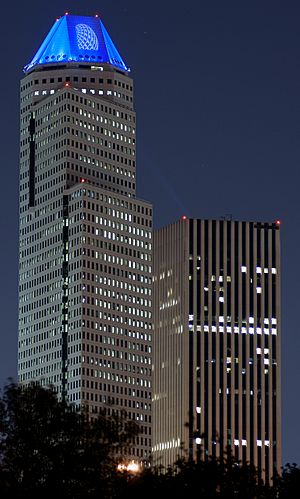1600 Smith Street facts for kids
Quick facts for kids 1600 Smith Street |
|
|---|---|

1600 Smith Street (formerly Continental Center I)
|
|
| General information | |
| Status | Complete |
| Type | Office |
| Location | Downtown Houston, Texas, United States |
| Coordinates | 29°45′19″N 95°22′22″W / 29.75518°N 95.37275°W |
| Completed | 1984 |
| Owner | Brookfield Properties |
| Management | Brookfield Properties |
| Height | |
| Roof | 732 ft (223 m) |
| Technical details | |
| Floor count | 53 |
| Floor area | 1,097,960 sq ft (102,004 m2) |
| Design and construction | |
| Architect | Morris Architects (formerly Morris Aubry) |
1600 Smith Street is a very tall office building in Downtown Houston, Texas. It has 51 stories and stands about 732 feet (223 meters) high.
This building was once known as Continental Center I and Cullen Center Plaza. It used to be the main office for Continental Airlines before they joined with United Airlines. It was also home to ExpressJet Airlines for a while. The building is part of a larger group of buildings called the Cullen Center.
The 51-story building offers over 1 million square feet (about 100,000 square meters) of office space. Morris Architects designed the building. Linbeck Construction Company built it, and it was finished in 1984.
1600 Smith Street has a postmodern design. It is currently the 9th-tallest building in Houston.
Contents
History of 1600 Smith Street
Early Years and Ownership
When it first opened in 1984, 1600 Smith Street had many empty offices. Some people saw it as a sign that Houston had built too many new buildings.
By 1987, a Canadian company called Trizec Group bought parts of the Cullen Center. This included 1600 Smith Street.
Continental Airlines Moves In
In September 1997, Continental Airlines announced big news. They would bring all their Houston offices together into what would become Continental Center I. They planned to move about 3,200 employees. This move happened in steps from July 1998 to January 1999.
Continental Airlines decided to lease a large amount of space in the Cullen Center. They planned to use 15 floors in Continental Center I. They also added a company store and a credit union for employees.
To make space for Continental, Trizec worked with Shell Oil Company. Shell agreed to use less space in the building. Another company, Houston Industries, Inc., also moved out of some space. This helped make more room for Continental Airlines.
The Mayor of Houston at the time, Bob Lanier, was very happy about Continental Airlines moving downtown. He said it was a huge step for the city.
Building Challenges and New Tenants
In September 2000, a power problem at Continental Center I caused delays. This led to hundreds of Continental Airlines flights being delayed around the world.
After the September 11 attacks, Continental Airlines reduced its staff. However, they still kept their offices in Continental Center I and Continental Center II.
In 2004, three new companies signed leases to move into Continental Center I. These included Southwest Bank of Texas (now Amegy Bank), Tana Exploration Co. LLC, and Stinnett Thiebaud & Remington LLP.
Chevron Becomes a Major Tenant
In February 2006, Chevron U.S.A. Inc. signed a large lease. They took over 465,000 square feet (about 43,000 square meters) of space. This filled the building almost completely.
Chevron planned to move 1,300 employees into 20 floors of the building. They started moving in during the second half of 2006.
Continental's Lease Renewal and Departure
In 2008, Continental Airlines renewed its lease for a large part of Continental Center I. There were rumors that the airline might move its headquarters closer to George Bush Intercontinental Airport. However, they decided to stay downtown.
In 2010, Continental Airlines and United Airlines announced they would merge. The new company's main office would be in Chicago. Continental had about 3,000 employees in its Houston offices at the time.
After the merger, United Airlines continued to use space in the building for a while. But by 2016, they decided to move out completely by the end of 2017.
In 2011, Chevron renewed its lease for more space in the building for seven years.
As of July 2018, about 69% of the building was leased. This meant there was still over 500,000 square feet (about 46,000 square meters) of space available.
Building Design and Features

Continental Center I has a special blue lighting pattern on its roof. This lighting used to show the Continental Airlines logo.
When Continental Airlines moved in, they wanted to put their logo on the roof. The City of Houston had a rule about how tall signs could be downtown. In 2000, the Houston City Council changed this rule. The new rule allowed taller signs if a company's national headquarters took up a large part of a downtown building.
The Mayor, Lee P. Brown, supported this change. He said it was a promise made to Continental Airlines to encourage them to move to Houston. Some people worried that many company logos would start appearing on the Houston skyline.
The elevators in the building were made by Fujitec.
Gallery
See also
 In Spanish: 1600 Smith Street para niños
In Spanish: 1600 Smith Street para niños
 | Selma Burke |
 | Pauline Powell Burns |
 | Frederick J. Brown |
 | Robert Blackburn |


